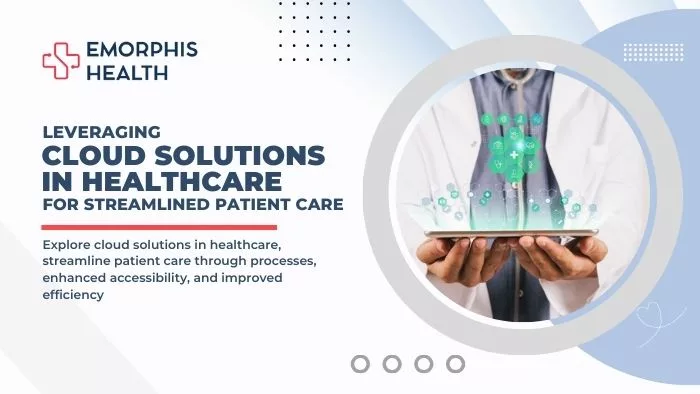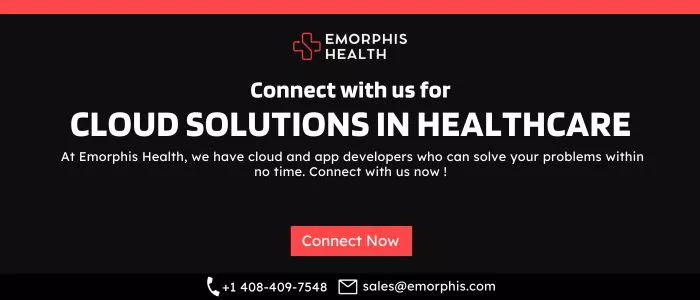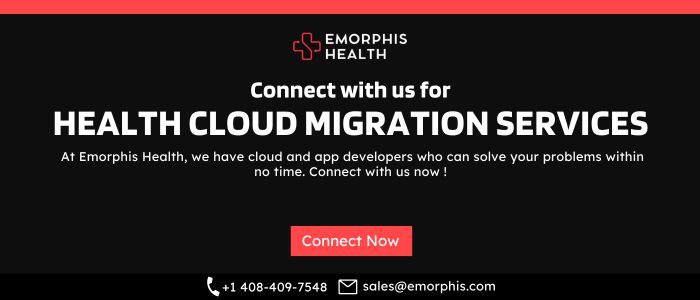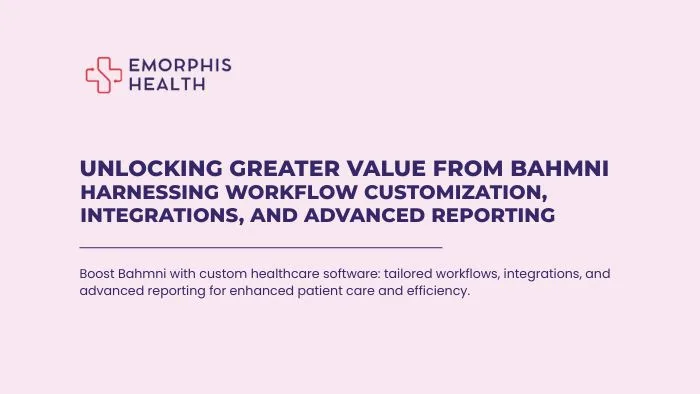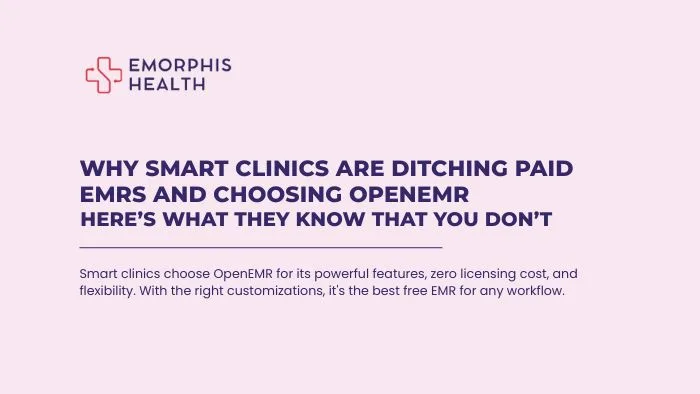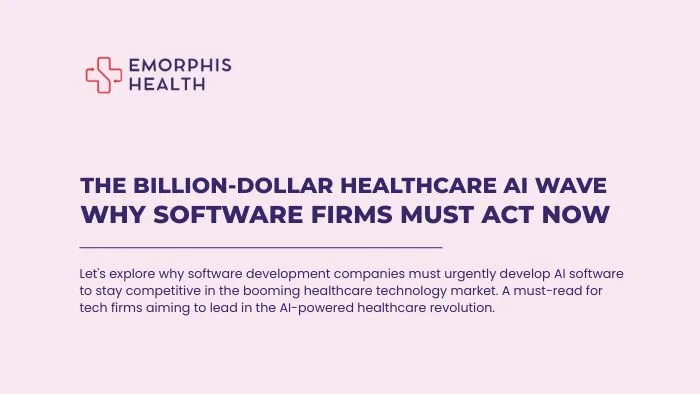The Pain Point: Healthcare Challenges
See Contents
- 1 The Pain Point: Healthcare Challenges
- 2 The Role of Cloud Solutions in Healthcare
- 3 Examples of Cloud Solutions in Healthcare
- 4 Popular Healthcare Clouds
- 5 Best Practices for a Smooth Transition to Cloud-based Healthcare Solutions
- 6 Developing a Custom Cloud Solution in Healthcare – A Comprehensive Guide
- 7 Conclusion
In the healthcare industry, staying up-to-date with the latest advancements in patient care and medical technology is not just a matter of necessity; it’s a matter of life and death. In fact, healthcare entities grapple with a multitude of challenges daily, ranging from data management to accessibility, and these challenges often hinder their ability to provide optimal patient care. Cloud solutions in healthcare have emerged as a lifeline to tackle these issues head-on.
Let’s delve into the key challenges and understand how cloud-based healthcare solutions can revolutionize the industry.
– Data Overload and Management
The healthcare industry generates vast amounts of data daily, encompassing patient records, diagnostic images, treatment plans, and more. This data must be managed efficiently, and securely, and be readily accessible when needed. The process of managing and storing these data can be overwhelming, leading to delays, inefficiencies, and potential data breaches, as data security is paramount in the healthcare sector.
Cloud solutions for healthcare industry are designed to handle this data tsunami. They provide scalable, secure, and compliant storage and data management systems. In fact, AWS for Healthcare, Microsoft Cloud for Healthcare, and Google Cloud healthcare services have recognized the importance of data management in the industry and offer tailor-made solutions for healthcare entities.
– Accessibility and Interoperability
Ensuring that patient data is accessible when and where it’s needed is a critical challenge. In fact, patients may receive care from multiple providers and locations, and their data must follow them seamlessly. Legacy systems often lack interoperability, hindering the sharing of critical patient information and slowing down the decision-making process.
Cloud-based healthcare solutions, as a matter of fact, excel in promoting accessibility and interoperability. Cloud solutions in healthcare break down data silos, enabling healthcare professionals to access patient records, test results, and treatment histories in real time, regardless of their location. This not only speeds up the care process but also results in better decision-making, which is vital for patient outcomes.
Now let us check in more detail what role Cloud solutions in healthcare play in helping healthcare organizations.
The Role of Cloud Solutions in Healthcare
Cloud Healthcare Solutions
With the understanding of these pain points, it becomes clear that cloud healthcare computing is not merely a luxury but a necessity in the modern healthcare landscape. Cloud healthcare solutions play a pivotal role in addressing these challenges head-on, offering healthcare entities a chance to improve efficiency and accessibility in patient care.
Now, let’s delve deeper into how these cloud solutions can transform the healthcare sector and what benefits they bring to the table.
A. Benefits of Cloud Solutions in Healthcare
When it comes to improving healthcare operations, cloud solutions in healthcare offer a multitude of benefits. In fact, they are not just advantageous; they are essential. Here are some key advantages:
1. Scalability
Cloud-based solutions allow healthcare entities to scale their IT resources as needed. Whether it’s expanding data storage to accommodate more patient records or increasing computing power to run complex medical simulations, the cloud can adjust on demand.
2. Cost-effectiveness
In the healthcare industry, where budgets are often tight, managing costs is crucial. Cloud solutions in healthcare can reduce capital expenses associated with maintaining on-premises servers and IT infrastructure. With pay-as-you-go pricing models, healthcare providers can allocate resources efficiently and cut unnecessary expenses.
3. Real-time Data Access
Cloud solutions in healthcare facilitate real-time access to patient data. This is critical for healthcare professionals who need instant access to medical records, diagnostic images, and test results to make timely decisions, provide effective care, and potentially save lives.
4. Collaboration and Remote Access
Moreover, cloud systems foster collaboration and remote access. Healthcare professionals can securely share patient data, consult with specialists worldwide, and provide telemedicine services. This is especially relevant in the current global context, where telehealth and remote consultations are increasingly vital.
5. Data Analytics
In fact, cloud solutions offer powerful data analytics capabilities. By harnessing the cloud’s processing power, healthcare entities can analyze patient data for patterns, trends, and insights. This aids in early disease detection, treatment optimization, and predictive healthcare analytics.
6. Disaster Recovery and Redundancy
Data loss in healthcare is not an option. Cloud-based solutions often include robust disaster recovery features, ensuring data redundancy and backup, so patient data remains secure and accessible even in the face of unforeseen disasters.
7. Improved Patient Experience
As a matter of fact, cloud solutions in healthcare can lead to an enhanced patient experience. Patients can access their medical records online, schedule appointments, and receive personalized healthcare recommendations more conveniently, thereby increasing patient engagement and satisfaction.
By harnessing these benefits, healthcare entities can not only streamline their operations but also enhance the quality of patient care, which is the goal of any healthcare provider.
The integration of cloud solutions in healthcare represents a paradigm shift in how the industry operates and provides care to patients. From data management to patient accessibility, the cloud is poised to revolutionize healthcare in unprecedented ways.
In the next section, we’ll explore how healthcare providers can ensure data security and compliance while transitioning to cloud-based systems.
B. Ensuring Data Security and Compliance
One of the paramount concerns in healthcare is the security and compliance of patient data. As the transition to cloud solutions for healthcare gains momentum, healthcare entities must take robust measures to safeguard sensitive information and adhere to strict regulatory requirements.
Here’s how the cloud can ensure data security and compliance:
1. Data Encryption in Cloud Solutions in Healthcare
Cloud providers offer advanced encryption techniques, both in transit and at rest, to protect patient data from unauthorized access. With these measures in place, data breaches and cyberattacks can be mitigated.
2. Compliance Standards
Many cloud providers, including AWS for healthcare and Microsoft Cloud for healthcare, are compliant with industry-specific regulations such as HIPAA (Health Insurance Portability and Accountability Act) and GDPR (General Data Protection Regulation). This ensures that healthcare organizations can meet legal requirements effortlessly.
3. Access Controls
Cloud systems enable healthcare entities to implement granular access controls, ensuring that only authorized personnel can access specific data. Moreover, they allow for monitoring and auditing of data access, which is vital for compliance.
4. Data Backups
As a matter of fact, cloud solutions often include automated and frequent data backups. This redundancy ensures data availability even in the face of data loss, hardware failure, or natural disasters, meeting the requirements of healthcare’s stringent uptime demands.
5. Security Updates and Patches
Cloud providers regularly update their systems and apply security patches, reducing vulnerabilities and enhancing data security. Healthcare entities can rest assured that their systems are updated with the latest security measures.
6. Data Governance for Cloud Solutions in Healthcare
Cloud healthcare solutions offer robust data governance tools, allowing healthcare organizations to set data retention policies, enforce data integrity, and maintain comprehensive audit trails. This ensures data is managed in a structured and compliant manner.
It’s essential for healthcare providers to collaborate closely with their chosen cloud service provider to establish secure cloud environments tailored to their specific needs. By adhering to the highest standards of data security and compliance, healthcare entities can trust that patient data remains confidential and protected.

Examples of Cloud Solutions in Healthcare
In the following section, we will explore real-world examples through case studies of healthcare providers who have successfully implemented cloud solutions to improve patient care and operational efficiency.
In this section, we’ll delve into real-world cloud healthcare solutions examples to illustrate how healthcare providers have leveraged cloud-based healthcare solutions to overcome challenges and achieve substantial improvements in patient care and operational efficiency.
Case Study 1: Hospital Ace – Streamlined Data Access
Hospital Ace, a large urban medical center, implemented Google Cloud Healthcare to address its data accessibility challenges. They had been struggling with disparate data silos across departments, making it difficult for healthcare providers to access patient records swiftly. Google Cloud Healthcare facilitated the integration of these data silos, providing healthcare professionals with real-time access to patient information from anywhere. As a result, the hospital improved response times, reduced errors, and enhanced patient care outcomes.
Case Study 2: Bit Clinic – Cost Savings with AWS for Healthcare
Bit Clinic is a small community clinic, that faced budget constraints and lacked the in-house IT expertise to manage extensive data storage. They chose AWS for healthcare as their cloud solution. By migrating to AWS, Bit Clinic achieved cost savings by eliminating the need for on-premises infrastructure maintenance and scaling resources according to their specific needs. The clinic could allocate funds more effectively to patient care and infrastructure improvements.
Case Study 3: Telemedicine Provider – Remote Access and Scalability
A telemedicine company that caters to remote patients and specialists. They adopted Microsoft Cloud for healthcare to facilitate secure, remote access to patient data. This allowed specialists to consult on patient cases from various locations, greatly expanding their service reach. Microsoft’s cloud also accommodated rapid scalability, enabling the provider to grow its telemedicine services rapidly.
These case studies underscore the versatility of cloud solutions in healthcare. They demonstrate that whether you’re a large medical center, a community clinic, or a specialized telemedicine provider, cloud solutions can be tailored to meet your specific needs. In fact, they have the potential to yield significant improvements in patient care and operational efficiency.
The implementation of cloud solutions not only benefits healthcare providers but also enhances the overall healthcare landscape.
In the next section, check with popular cloud healthcare solutions and how to leverage the.
Read about Cloud Computing in Healthcare – Transforming Healthcare Landscape
Popular Healthcare Clouds
AWS for Healthcare
AWS (Amazon Web Services) for healthcare is a cloud solution that offers a range of services tailored specifically to the healthcare industry. Its benefits and implementation strategies for healthcare organizations are as follows:
Benefits
- Security and Compliance: AWS for healthcare provides a secure environment to store and manage healthcare data. It is compliant with regulations like HIPAA, enabling healthcare organizations to meet stringent data security requirements.
- Scalability: Healthcare organizations can scale their resources as needed, allowing them to accommodate growing patient data, medical records, and diagnostic images without major capital investments.
- Data Analytics: AWS offers advanced data analytics tools that can help healthcare providers derive insights from patient data. These insights can inform better decision-making, disease prediction, and treatment optimization.
- Cost-Efficiency: The pay-as-you-go pricing model offered by AWS can lead to significant cost savings, as healthcare organizations only pay for the resources they use. This cost-efficiency is especially beneficial for healthcare organizations with budget constraints.
- Telemedicine and Remote Care: AWS facilitates telemedicine by providing the necessary infrastructure for secure video conferencing and remote patient monitoring, helping healthcare organizations expand their service reach.
Implementation Strategies
AWS for healthcare, can further enhance utilization by:
- Data Analytics Integration: Explore AWS’s advanced data analytics tools to gain insights from patient data, facilitating early disease detection and personalized medicine.
- IoT Integration: Utilize AWS IoT services to integrate Internet of Things (IoT) devices for remote patient monitoring, helping in proactive care management.
- Blockchain Adoption: Investigate AWS’s blockchain services for improving the security and transparency of healthcare transactions and records.
Microsoft Cloud for Healthcare
Microsoft Cloud for Healthcare is a comprehensive cloud solution tailored to the unique needs of the healthcare industry. Here’s why healthcare organizations should implement cloud healthcare solutions and how they can further leverage its capabilities:
Benefits
- Integration with Existing Systems: Microsoft Cloud for Healthcare seamlessly integrates with existing healthcare systems and electronic health records (EHR) systems, reducing the complexity of migration and ensuring continuity of care.
- Data Security and Compliance: It offers robust security features and adheres to healthcare compliance standards, including HIPAA and GDPR, ensuring patient data is secure and compliant.
- Collaboration and Telemedicine: Microsoft Teams is integrated, enabling secure communication and telehealth services. Healthcare organizations can conduct remote consultations and collaborate effectively.
- Data Analytics and AI: Azure AI and Power BI are incorporated, enabling healthcare providers to harness the power of artificial intelligence and data analytics for improved patient care and operational efficiency.
- IoT Capabilities: Microsoft Azure IoT services allow for the integration of IoT devices for remote patient monitoring, enhancing patient engagement and preventative care.
Implementation Strategies
Microsoft Cloud for healthcare, the following strategies can further optimize its use:
- Advanced AI Integration: Explore the potential of Azure AI to develop predictive models for disease diagnosis and patient outcomes.
- Personalized Medicine: Leverage the data analytics capabilities to tailor treatment plans to individual patients, improving the overall quality of care.
- IoT Expansion: Expand the integration of IoT devices to monitor vital signs and chronic conditions more comprehensively.
Google Cloud Healthcare
Google Cloud Healthcare is a cloud solution designed to support healthcare organizations by providing data storage, analytics, and AI capabilities. Here’s why healthcare organizations should consider its implementation and how they can maximize its advantages:
Benefits
- Data Storage and Integration: Google Cloud Healthcare offers scalable and secure data storage solutions, making it easy to consolidate patient records and integrate data from multiple sources.
- Data Analytics and AI: Google’s machine learning and AI tools enable healthcare organizations to extract valuable insights from patient data for improved diagnoses and treatment plans.
- Interoperability: The platform supports data interoperability, ensuring seamless exchange of patient information between healthcare providers and systems.
- Telemedicine Support: Google Cloud provides infrastructure for telemedicine, including secure video conferencing and remote patient monitoring capabilities.
Implementation Strategies
Google Cloud Healthcare, here are the following approaches that can further enhance its utilization for cloud healthcare solutions.
- Data Lake and Analytics Expansion: Utilize Google Cloud’s data lakes and advanced analytics capabilities to gain deeper insights from patient data.
- IoT Device Integration: Extend the use of IoT devices to capture more patient health data and improve remote monitoring.
- Blockchain Applications: Explore how Google Cloud can support blockchain technology to enhance the security and privacy of healthcare transactions and data.
- Patient Engagement: Leverage AI and data analytics to develop tools for patient engagement, such as personalized health recommendations and reminders.
These cloud solutions AWS for Healthcare, Microsoft Cloud for Healthcare, and Google Cloud Healthcare offer healthcare organizations the tools and infrastructure needed to improve patient care, streamline operations, and adapt to the evolving healthcare landscape. Continuous exploration and optimization of these cloud capabilities can result in better healthcare outcomes for both providers and patients.
Now, in the following section, we’ll provide best practices to ensure a smooth transition to cloud-based healthcare solutions, or cloud healthcare solutions helping healthcare providers optimize their operations and enhance patient care.
Health Cloud in Salesforce
Salesforce’s Health Cloud offers a robust solution for healthcare organizations seeking to optimize their operations and enhance patient care. Its benefits and strategic considerations for healthcare entities are as follows:
Benefits
- Patient-Centric Approach: Salesforce’s Health Cloud places patients at the center of care. It offers a 360-degree view of patients, allowing healthcare providers to deliver personalized, patient-focused care.
- Secure Data Management: Data security and compliance are prioritized within Health Cloud. It complies with healthcare regulations like HIPAA, ensuring the confidentiality and integrity of patient data.
- Efficient Care Coordination: The platform streamlines care coordination by connecting healthcare professionals, enabling them to collaborate in real-time, share patient information, and make data-driven decisions.
- Data Analytics and AI: Health Cloud integrates advanced data analytics and AI capabilities, enabling healthcare organizations to derive insights from patient data, identify trends, and optimize treatment plans.
- Telehealth Integration: In response to the growing importance of telehealth, Health Cloud offers features to support remote consultations and telemedicine services, improving patient accessibility to care.
Implementation Strategies
When implementing Health Cloud in Salesforce, healthcare organizations can maximize cloud healthcare solutions utility by:
- Customization and Configuration: Tailor the platform to the unique needs of your organization. Customize fields, workflows, and reports to align with your processes and data requirements.
- Integration with Existing Systems: Seamlessly integrate Health Cloud with existing electronic health record (EHR) systems and other healthcare software to ensure data flow and consistency.
- Training and Onboarding: Invest in thorough training programs to ensure that healthcare staff is proficient in using Health Cloud.
- Patient Engagement: Leverage Health Cloud’s patient engagement capabilities, such as personalized health recommendations and reminders, to improve patient outcomes and satisfaction.
- Continuous Feedback and Improvement: Continuously gather feedback from users to identify areas for improvement. Regularly optimize your Health Cloud implementation based on user input.
Salesforce’s Health Cloud is a powerful tool for healthcare organizations seeking to enhance patient care, streamline operations, and adapt to the evolving healthcare landscape. Its versatility, combined with strategic implementation, can lead to better patient outcomes and operational efficiency.
For details on the various cloud connect with us for more details.
Best Practices for a Smooth Transition to Cloud-based Healthcare Solutions
Transitioning to cloud-based healthcare solutions requires careful planning and execution to ensure a seamless shift. Here are some best practices for healthcare entities looking to make this transition:
1. Comprehensive Training
Provide training to your staff to ensure they are proficient in using the new cloud systems. This training should cover data access, security protocols, and system functionalities.
2. Data Migration Strategy
Develop a robust data migration plan to ensure a smooth transition of existing data to the cloud. Regularly back up data to prevent loss during migration.
3. Data Governance
Establish clear data governance policies to maintain data integrity, access controls, and compliance during and after the transition.
4. Testing and Quality Assurance
Conduct thorough testing to identify and resolve any issues before going live. Implement quality assurance processes to ensure system reliability.
5. Feedback and Continuous Improvement
Continuously seek feedback from healthcare professionals and staff using the new system. Use this feedback to make improvements and optimize the cloud-based solutions.
6. Emergency Response Plan
Create a comprehensive emergency response plan that outlines steps to be taken in case of system disruptions or data breaches. Ensure staff is aware of these procedures.
By following these best practices, healthcare entities can ensure a smooth transition to cloud-based healthcare solutions and minimize disruptions to patient care. In the following sections, we will explore the future of healthcare in the cloud, emerging trends, and innovations reshaping the industry.
Developing a Custom Cloud Solution in Healthcare – A Comprehensive Guide
The healthcare industry is increasingly turning to custom cloud solutions to address its unique challenges and improve patient care. Crafting a tailored cloud solution for healthcare requires a strategic approach, considering security, compliance, data management, and accessibility. In this guide, we’ll explore the key steps and considerations for developing a custom cloud solution in healthcare, emphasizing the importance of various aspects throughout the process.
A. Needs Assessment and Planning
First and foremost, healthcare organizations must conduct a thorough needs assessment and strategic planning. It involves identifying the specific requirements, objectives, and pain points that the custom cloud solution aims to address. This step should also include defining the scope, budget, and timelines.
B. Data Security and Compliance
Ensuring data security and compliance is paramount in healthcare. Healthcare entities must comply with regulations such as HIPAA, GDPR, and others. Moreover, encryption, access controls, and audit trails are crucial to maintain the confidentiality and integrity of patient data. The custom cloud solution must be designed with these security measures in mind.
C. Data Integration and Interoperability
Data integration and interoperability are key challenges in healthcare. As a matter of fact, the custom cloud solution or cloud healthcare solutions should support the seamless exchange of data among various systems and providers. It should break down data silos, allowing for a comprehensive view of patient records and enabling healthcare professionals to make informed decisions.
Here is a must-read article on Healthcare Interoperability – Key Challenges and Resolutions
D. Scalability and Performance with Cloud Solutions in Healthcare
The custom cloud solution must be able to scale resources according to the growing demands of healthcare organizations. In fact, the ability to handle increasing patient data, medical records, and diagnostic images is essential. Performance optimization is equally important to ensure swift data access and processing.
E. Telemedicine and Remote Care
Telemedicine and remote care services are becoming increasingly relevant. The custom cloud solution or cloud healthcare solutions should facilitate secure video conferencing, remote patient monitoring, and the exchange of health data for telehealth consultations. Additionally, it should be designed to offer a seamless and user-friendly telemedicine experience for both patients and healthcare professionals.
Read in detail about Top Advancements and Trends in Remote Patient Monitoring App Development
F. Data Analytics and AI Integration with Cloud Solutions in Healthcare
Data analytics and artificial intelligence (AI) can offer valuable insights in healthcare. The custom cloud solution should support advanced analytics tools, enabling healthcare providers to harness data for early disease detection, treatment optimization, and predictive analytics. Furthermore, AI can help in automating routine tasks and improving the accuracy of diagnoses.
G. Mobile and Remote Access with Cloud Solutions in Healthcare
Healthcare professionals often need to access patient data remotely. To this end, the custom cloud solution or cloud healthcare solutions should be accessible via mobile devices and secure remote connections, ensuring that healthcare providers can provide quality care regardless of their location. This is particularly important in emergency situations and in improving overall patient care accessibility.
H. User Training and Change Management
Adequate user training and change management strategies are crucial for successful implementation. Consequently, healthcare organizations should invest in training programs and ensure that staff members are proficient in using the custom cloud solution. Effective change management helps healthcare professionals adapt to new workflows and processes.
I. Testing and Quality Assurance
Prior to full implementation, rigorous testing and quality assurance procedures are essential. In fact, extensive testing helps identify and rectify issues, ensuring that the custom cloud solution is reliable, secure, and performs as expected. Rigorous quality assurance guarantees a smooth transition and minimizes disruptions.
J. Continuous Improvement and Feedback
Even after implementation, the journey doesn’t end. In fact, healthcare organizations should encourage feedback from users to identify areas of improvement. Continuous enhancement and optimization of the custom cloud solution based on user input are essential for maintaining efficiency and relevance in the ever-evolving healthcare industry.
K. Disaster Recovery and Redundancy
The custom cloud solution or cloud healthcare solutions should include robust disaster recovery measures, including data redundancy and backup. As a result, healthcare entities can ensure data availability even in the event of data loss, hardware failure, or natural disasters.
L. Long-Term Viability and Partnerships
Healthcare organizations should assess the long-term viability of the custom cloud solution and its provider. In addition, fostering strong partnerships with the cloud solution provider ensures ongoing support and innovation aligned with evolving healthcare needs.
Developing a custom cloud solution in healthcare is a complex yet highly rewarding endeavor. It demands a holistic approach, with meticulous planning, a focus on security and compliance, and a commitment to addressing healthcare’s unique challenges. With the right strategy and continuous improvement, healthcare entities can unlock the full potential of a custom cloud solution to improve patient care and operational efficiency.
Conclusion
The adoption of cloud solutions in healthcare marks a pivotal moment in the evolution of the healthcare industry. These solutions offer effective responses to the challenges faced by healthcare entities, addressing issues of data management, accessibility, security, and operational efficiency. By embracing cloud-based healthcare solutions, or cloud healthcare solutions providers can unlock a new era of patient care characterized by enhanced efficiency and accessibility.
Moreover, we’ve emphasized the critical importance of data security and compliance in healthcare and how cloud solutions excel in safeguarding sensitive patient data. The case studies showcased real-world success stories where healthcare providers achieved significant improvements through cloud integration.
When choosing the right cloud provider, healthcare entities should consider factors such as compliance, security, scalability, and long-term viability. Best practices for a smooth transition ensure that the adoption of cloud-based solutions is executed efficiently and with minimal disruption.
Looking ahead, the future of healthcare in the cloud is filled with exciting possibilities. Telemedicine, data analytics, IoT, blockchain, interoperability, and personalized medicine are reshaping the healthcare landscape. These innovations aim to enhance patient care, improve efficiency, and advance the industry.
Look at a trending article based on the future of healthcare technology solutions – Digital Twin in Healthcare – Revolutionizing Patient Care and Advancing Innovation
In conclusion, the implementation of cloud solutions in healthcare is not just a choice but a necessity. Healthcare providers who embrace these solutions are better positioned to meet the ever-evolving needs of patients, deliver high-quality care, and drive operational excellence. Cloud healthcare solutions, or cloud represent a transformative force that will continue to shape the healthcare industry for years to come.
Connect with us to explore how Cloud solutions can help you.

